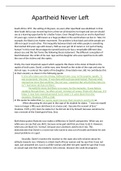Apartheid Never Left
South Africa 1997, the setting of Disgrace, six years after Apartheid was abolished. In that
time South Africa was recovering from a time we all should try to forget and one we should
see as a learning opportunity for a better future. Even though they put an end to Apartheid
29 years ago, racism is still known as a huge problem in the world where we live in. Take, for
example, the Black Lives Matter movement. The problem is that black and white people are
still not equal to each other. This inequality between black and white people is something
that started 400 years ago with slavery. Will we ever get rid of racism or is it part of being
human? In this novel the protagonist named David Lurie has a remarkable different idea
about race and this fact forms the following thesis statement: The different conception of
David between the victim of his own rape and his daughter who was raped has to do with
the race of the victims and the rapists.
Firstly, the most important aspect which supports this thesis is the vision of David on the
rapists of both cases. David, a white man, sees himself as the victim of the rape and says he
did not rape. In contrast the rapists of his daughter, three black men, did. He contributes this
to their ancestry as shown in the following quote:
It is he who takes over the driving. Halfway home, Lucy, to his surprise, speaks. ‘It
was so personal,’ she says. ‘It was done with such personal hatred. That was what
stunned me more than anything. The rest was… expected. But why did they hate me
so? I had never set Eyes on them.’
He waits for more, but there is no more, for the moments. ‘It was history
speaking through them,’ he offers at last. ‘A history of wrong. Think of it that way, if it
helps. It may have seemed personal, but it wasn’t. It came down from the
ancestors.’(Coetzee, 1999, p.156).
In this quote he states that the rapists raped, because their ancestors used to do so.
. When discussing his own part in the rape of his student he states: “I was not myself.
I was no longer a fifty-year-old divorcé at a loose end. I became the servant of Eros”
(Coetzee, 1999, p.52). Here he states he t he did not do it by himself, because somehow he
was a servant of the Greek god of love, Eros.
Both these quotes illustrate race makes a difference in David's perspective. When you are
white you can say that you did it, because some god said that you have to do it. However,
when you are black it is ‘normal’, because your ancestors used to do it too. This
demonstrates that David is a racist man who wants to stay out of trouble and blame his own
sexual problems on a god.
Secondly, David’s reaction the reaction to the rapes also tells volumes about his
attitude towards race. Melanie is a black South African woman and he says that it was not
rape, just unwanted sex. Lucy is a white woman and after she gets raped he says that it was
an actual rape and that she needed to visit a doctor, because she could be pregnant.






